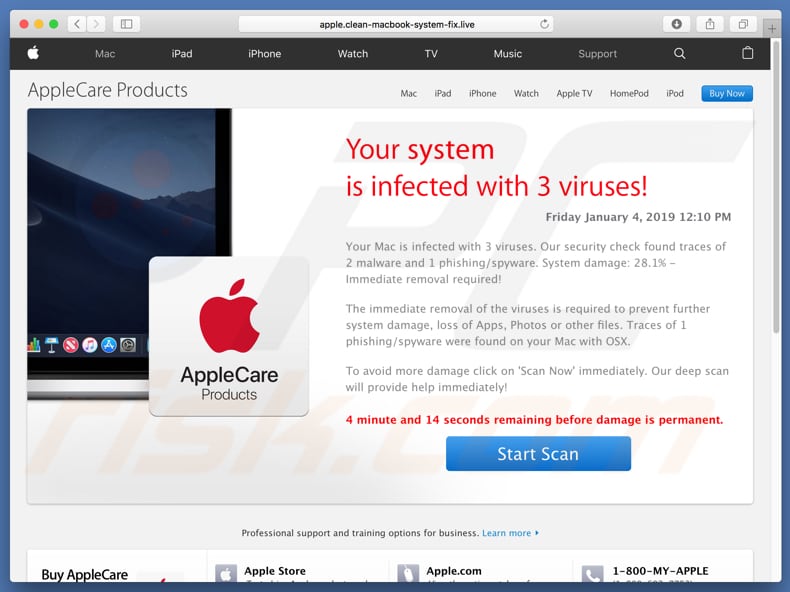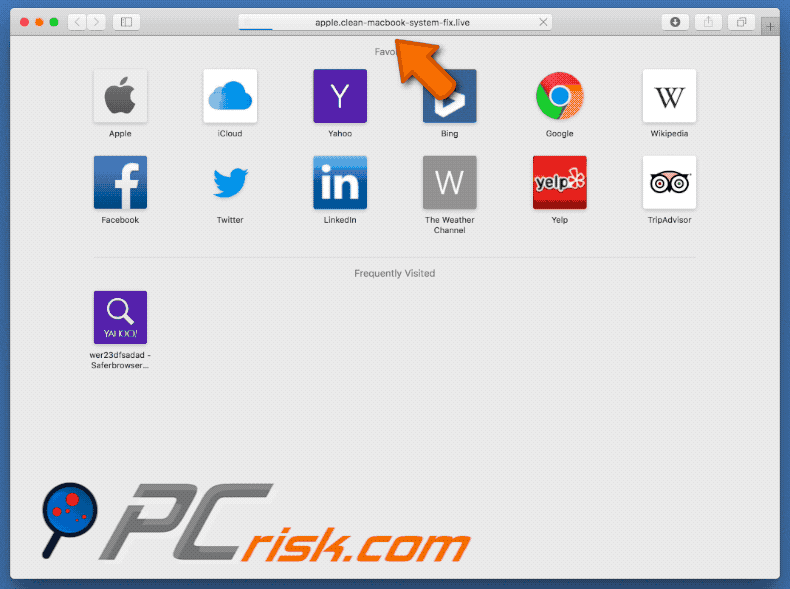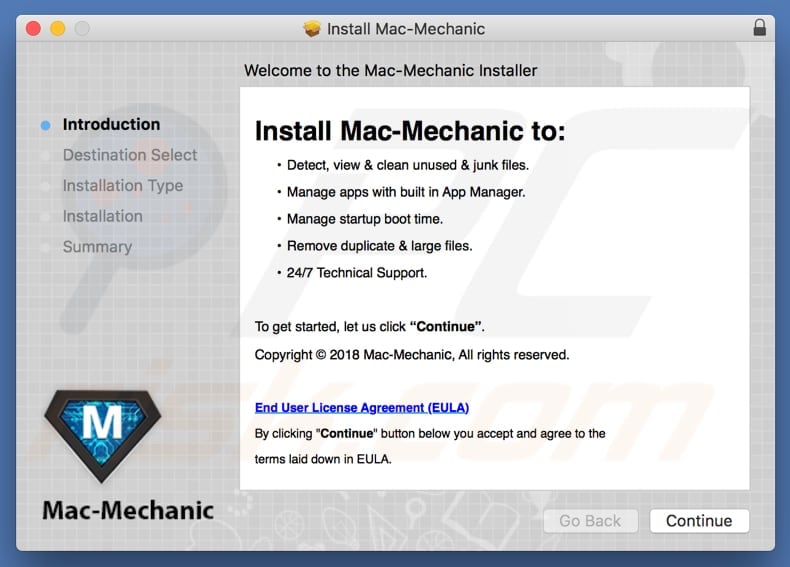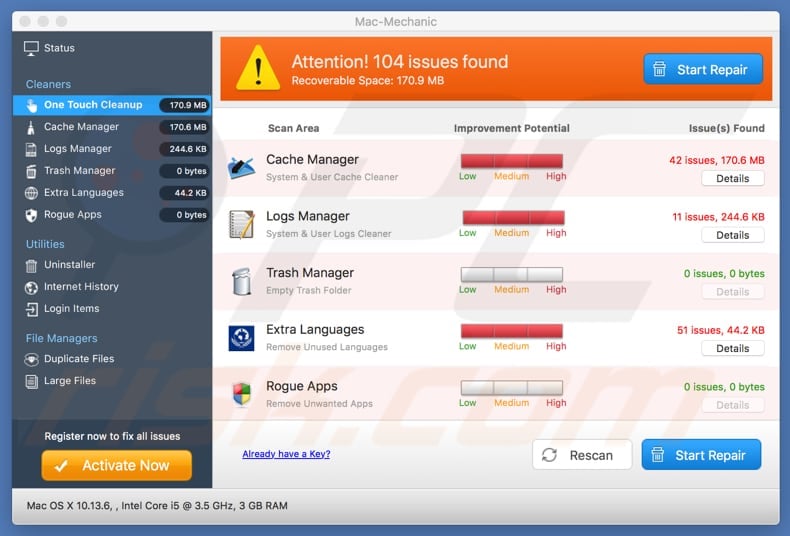Clean-macbook-system-fix.live POP-UP Scam (Mac)
Mac VirusAlso Known As: "Clean-macbook-system-fix.live" virus
Get free scan and check if your device is infected.
Remove it nowTo use full-featured product, you have to purchase a license for Combo Cleaner. Seven days free trial available. Combo Cleaner is owned and operated by RCS LT, the parent company of PCRisk.com.
What is "Clean-macbook-system-fix.live"?
"Clean-macbook-system-fix.live" is a deceptive website that scammers use to trick people into believing that their Mac computers are infected with viruses and to promote an app that can supposedly remove them. These fake virus alerts are usually displayed on untrustworthy websites that users visit inadvertently.
Typically, potentially unwanted applications (PUAs) force users to visit such websites. Furthermore, installed PUAs not only cause redirects to deceptive websites but also deliver intrusive ads and collect browsing-related data.

Scammers behind this fake virus alert claim that the visitor's computer is infected with viruses (in this case, three viruses: two malware and one phishing/spyware infection). They point out that a trojan (malicious program) called "e.tre456_worm_osx" has also been detected.
They urge website visitors to take immediate action to remove the detected infections, otherwise they might experience further damage and data loss. Users are given five minutes to click the "Scan Now" button.
Once the button is clicked, the website performs a fake system scan, displays a fake list of 'existing infections', and encourages users to click the "REMOVE VIRUSES NOW" button. Clicking this button leads to download of the app that this deceptive website promotes (at time of research, Mac-Mechanic).
To make the "Clean-macbook-system-fix.live" scam seem even more legitimate, scammers have designed this website to look as if it is an official Apple site. In fact, it is not related to Apple. Therefore, do not download apps promoted by untrustworthy/unofficial and deceptive websites. Ignore this virus alert and close the website.
These websites often prevent users from closing them. If this is the case, open Activity Monitor and 'force quit' the entire browser or simply restart the Mac. Do not restore the closed session, since this will reopen the deceptive website, or other website that led you to it in the first place.
As we mentioned above, most users end up visiting deceptive/untrustworthy websites due to PUAs. Typically, these apps force users to visit untrustworthy websites, feed them with intrusive ads, and record browsing-related information.
They deploy ads (coupons, banners, surveys, pop-ups, etc.) that are displayed using tools that enable placement of third party graphical content on any site. Clicking them often results in redirects to potentially malicious websites or execution of scripts designed to download/install other unwanted apps or even malware.
Additionally, PUAs collect IP addresses, search queries, geo-locations, URLs of visited websites (and other browsing-related data). Some of the data might include sensitive information. Developers share collected data with third parties (potentially, cyber criminals) who misuse it to generate revenue.
Therefore, having PUAs installed can lead to serious problems relating to privacy, browsing safety, and even identity theft.
| Name | "Clean-macbook-system-fix.live" virus |
| Threat Type | Mac malware, Mac virus |
| Symptoms | Your Mac became slower than normal, you see unwanted pop-up ads, you get redirected to shady websites. |
| Distribution methods | Deceptive pop-up ads, free software installers (bundling), fake flash player installers, torrent file downloads. |
| Damage | Internet browsing tracking (potential privacy issues), displaying of unwanted ads, redirects to shady websites, loss of private information. |
| Malware Removal (Windows) |
To eliminate possible malware infections, scan your computer with legitimate antivirus software. Our security researchers recommend using Combo Cleaner. Download Combo CleanerTo use full-featured product, you have to purchase a license for Combo Cleaner. 7 days free trial available. Combo Cleaner is owned and operated by RCS LT, the parent company of PCRisk.com. |
Many deceptive websites trick people into believing that their computers are infected, or that there are 'problems' that need to be fixed urgently. The main purpose of these websites is to extort money from users - trick them into paying for so-called services or apps.
Some examples of other deceptive websites include This Mac Is Not Secure, Getting Too Many Pop-up Ads, and Your MacOS 10.12 Sierra is infected with 3 viruses! Most PUAs are very similar. They are promoted as 'useful applications', however, once installed, deliver none of the features promised and are designed only to generate revenue for their developers.
How did potentially unwanted applications install on my computer?
Some PUAs are promoted through their official websites, however, research shows that most users install them through clicked intrusive ads or when installing other (regular) software.
To trick people into installing (or downloading) unwanted apps, developers use "bundling", a deceptive marketing method that hides unwanted apps in "Custom", "Advanced", and other settings of the download and installation set-ups. PUAs are not disclosed in set-ups.
Nevertheless, these unwanted installations or downloads generally occur when people skip installation (or download) steps without checking the settings. In this way, users give permission for PUAs to be downloaded/installed.
How to avoid installation of potentially unwanted applications?
To avoid unintentional/inadvertent installations/downloads, we advise you to download/install software and browse the web with care. Download software from official/trustworthy websites and using direct links. Do not use dubious websites, third party software downloaders/installers, or other dubious tools.
When downloading or installing software, check all available "Custom", "Advanced" and other settings. Opt-out of any unwanted apps and only then finish the procedure. Additionally, avoid clicking intrusive ads. Some are malicious and redirect to dubious websites.
If you are redirected to dubious websites or experience ads that lead you to them, check your browser for suspicious extensions, add-ons, and plug-ins.
Also check for unwanted programs installed on your computer (operating system). Remove all suspicious entries immediately. If your computer is already infected with PUAs, we recommend running a scan with Combo Cleaner Antivirus for Windows to automatically eliminate them.
Text presented in a deceptive website displaying "Clean-macbook-system-fix.live" scam:
IMMEDIATE ACTION REQUIRED
We have detected a trojan virus (e.tre456_worm_osx) on your Mac.
Press OK to begin the repair process.
Text in the website:Your system
is infected with 3 viruses!
Friday January 4, 2019 12:10 PMYour Mac is infected with 3 viruses. Our security check found traces of 2 malware and 1 phishing/spyware. System damage: 28.1% - Immediate removal required!
The immediate removal of the viruses is required to prevent further system damage, loss of Apps, Photos or other files. Traces of 1 phishing/spyware were found on your Mac with OSX.
To avoid more damage click on 'Scan Now' immediately. Our deep scan will provide help immediately!
4 minute and 7 seconds remaining before damage is permanent.
Start Scan
Appearance of "Clean-macbook-system-fix.live" scam (GIF):

Screenshot of the promoted app (Mac-Mechanic) installer:

Screenshot of the Mac-Mechanic app:

Instant automatic malware removal:
Manual threat removal might be a lengthy and complicated process that requires advanced IT skills. Combo Cleaner is a professional automatic malware removal tool that is recommended to get rid of malware. Download it by clicking the button below:
DOWNLOAD Combo CleanerBy downloading any software listed on this website you agree to our Privacy Policy and Terms of Use. To use full-featured product, you have to purchase a license for Combo Cleaner. 7 days free trial available. Combo Cleaner is owned and operated by RCS LT, the parent company of PCRisk.com.
Quick menu:
- What is "Clean-macbook-system-fix.live" virus?
- How to identify a pop-up scam?
- How do pop-up scams work?
- How to remove fake pop-ups?
- How to prevent fake pop-ups?
- What to do if you fell for a pop-up scam?
How to identify a pop-up scam?
Pop-up windows with various fake messages are a common type of lures cybercriminals use. They collect sensitive personal data, trick Internet users into calling fake tech support numbers, subscribe to useless online services, invest in shady cryptocurrency schemes, etc.
While in the majority of cases these pop-ups don't infect users' devices with malware, they can cause direct monetary loss or could result in identity theft.
Cybercriminals strive to create their rogue pop-up windows to look trustworthy, however, scams typically have the following characteristics:
- Spelling mistakes and non-professional images - Closely inspect the information displayed in a pop-up. Spelling mistakes and unprofessional images could be a sign of a scam.
- Sense of urgency - Countdown timer with a couple of minutes on it, asking you to enter your personal information or subscribe to some online service.
- Statements that you won something - If you haven't participated in a lottery, online competition, etc., and you see a pop-up window stating that you won.
- Computer or mobile device scan - A pop-up window that scans your device and informs of detected issues - is undoubtedly a scam; webpages cannot perform such actions.
- Exclusivity - Pop-up windows stating that only you are given secret access to a financial scheme that can quickly make you rich.
Example of a pop-up scam:

How do pop-up scams work?
Cybercriminals and deceptive marketers usually use various advertising networks, search engine poisoning techniques, and shady websites to generate traffic to their pop-ups. Users land on their online lures after clicking on fake download buttons, using a torrent website, or simply clicking on an Internet search engine result.
Based on users' location and device information, they are presented with a scam pop-up. Lures presented in such pop-ups range from get-rich-quick schemes to fake virus scans.
How to remove fake pop-ups?
In most cases, pop-up scams do not infect users' devices with malware. If you encountered a scam pop-up, simply closing it should be enough. In some cases scam, pop-ups may be hard to close; in such cases - close your Internet browser and restart it.
In extremely rare cases, you might need to reset your Internet browser. For this, use our instructions explaining how to reset Internet browser settings.
How to prevent fake pop-ups?
To prevent seeing pop-up scams, you should visit only reputable websites. Torrent, Crack, free online movie streaming, YouTube video download, and other websites of similar reputation commonly redirect Internet users to pop-up scams.
To minimize the risk of encountering pop-up scams, you should keep your Internet browsers up-to-date and use reputable anti-malware application. For this purpose, we recommend Combo Cleaner Antivirus for Windows.
What to do if you fell for a pop-up scam?
This depends on the type of scam that you fell for. Most commonly, pop-up scams try to trick users into sending money, giving away personal information, or giving access to one's device.
- If you sent money to scammers: You should contact your financial institution and explain that you were scammed. If informed promptly, there's a chance to get your money back.
- If you gave away your personal information: You should change your passwords and enable two-factor authentication in all online services that you use. Visit Federal Trade Commission to report identity theft and get personalized recovery steps.
- If you let scammers connect to your device: You should scan your computer with reputable anti-malware (we recommend Combo Cleaner Antivirus for Windows) - cyber criminals could have planted trojans, keyloggers, and other malware, don't use your computer until removing possible threats.
- Help other Internet users: report Internet scams to Federal Trade Commission.
Share:

Tomas Meskauskas
Expert security researcher, professional malware analyst
I am passionate about computer security and technology. I have an experience of over 10 years working in various companies related to computer technical issue solving and Internet security. I have been working as an author and editor for pcrisk.com since 2010. Follow me on Twitter and LinkedIn to stay informed about the latest online security threats.
PCrisk security portal is brought by a company RCS LT.
Joined forces of security researchers help educate computer users about the latest online security threats. More information about the company RCS LT.
Our malware removal guides are free. However, if you want to support us you can send us a donation.
DonatePCrisk security portal is brought by a company RCS LT.
Joined forces of security researchers help educate computer users about the latest online security threats. More information about the company RCS LT.
Our malware removal guides are free. However, if you want to support us you can send us a donation.
Donate
▼ Show Discussion